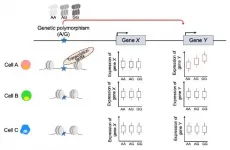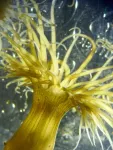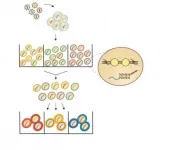(Press-News.org) Researchers in Japan have compiled a first-of-its-kind genetic database for autoimmune and autoinflammatory diseases. This resource will allow experts to more deeply understand how immune disorders develop and plan future drug discovery projects. Scientists also hope this atlas of immune-related genome data may eventually be applied to investigations of infectious diseases like COVID-19.
"To understand diseases, a deep comprehension of the function of genetic variants is essential. With this data set, we can connect the data about changes to DNA sequence associated with a disease to genes and cell types that are important for disease pathogenesis," said University of Tokyo Project Research Associate Mineto Ota, M.D., Ph.D., a clinical rheumatologist and expert in functional genomics. Ota is lead author of the study recently published in Cell. The project was completed with collaborators at RIKEN research institution and Chugai Pharmaceutical Co., Ltd.
Many prior research projects have compared the full genome sequences of patients with medical diagnoses to those of healthy people. Any DNA sequence variants identified in these genomewide association studies are then considered "associated" with the disease.
Many variants identified in association studies are not located in genes, the basic units of heredity, but rather in portions of DNA that regulate the "on" or "off" expression of genes. Most of the human genome is not genes, but this regulatory DNA. Experts might know that a portion of DNA is involved in gene regulation, but not understand exactly how or what it does or even what genes it regulates.
To uncover the function of regulatory DNA, a different type of genome study called expression quantitative trait loci (eQTL) analysis attempts to connect differences in DNA sequence to differences in gene expression. With eQTL data, researchers can make more informed guesses about the purpose of regulatory DNA sequences, how variants in the regulatory sequence might affect expression of the genes it regulates and how those differences in gene expression cause disease.
Other immune-focused eQTL studies have been performed, but prior research efforts included only healthy volunteers and examined a limited number of cell types.
"Inflammatory conditions create very different physical characteristics in immune cells compared to the same cells in a healthy condition. The genetic variants associated with immune conditions may only function in the diseased state, so for this type of genetic study, it was very important to get samples from real patients," said Ota.
The research team sequenced the full genomes of 79 healthy volunteers and 337 patients diagnosed with any of 10 different categories of immune-mediated diseases, including rheumatoid arthritis, systemic lupus erythematosus and systemic sclerosis. All volunteers had Japanese ancestry.
Understanding immune-mediated diseases is challenging because although each disease is clinically distinct, there are many overlaps and patients with the same diagnosis may show very different symptoms.
"Due to all this diversity, there's a limit to how much you can learn studying one immune-mediated disease at a time. But if we study 10 diseases together, it gives a bigger picture about these types of diseases," Ota explained.
After completing full genome sequencing, researchers isolated 28 different types of immune-related cells from volunteers' blood samples and measured gene expression in those cells.
The database created through this research was named the Immune Cell Gene Expression Atlas from the University of Tokyo (ImmuNexUT).
"We see that each immune cell type has distinctive eQTL results in the atlas, which can tell us how gene regulation differs between cell types and exactly which cell type is important for developing which disease," said Ota.
ImmuNexUT is now the largest eQTL data set built using volunteers of East Asian ancestry.
"In this field so far, large-scale genomic and functional genomic studies have been mainly conducted with European donors, although population diversity is critical for precise understanding of the genomic functions. This eQTL atlas of Japanese subjects is also meaningful for overcoming this European-centric bias and further investigating the functions of DNA variants in combination with European data sets," said Ota.
Researchers hope the ImmuNexUT database will continue to grow and eventually lead to better outcomes for patients.
INFORMATION:
Research Publication
Ota M, Nagafuchi Y, Hatano H, Ishigaki K, Terao C, Takeshima Y, Yanaoka H, Kobayashi S, Okubo M, Shirai H, Sugimori Y, Maeda J, Nakano M, Yamada S, Yoshida R, Tsuchiya H, Tsuchida Y, Akizuki S, Yoshifuji H, Ohmura K, Mimori T, Yoshida K, Kurosaka D, Okada M, Setoguchi D, Kaneko H, Ban N, Yabuki N, Matsuki K, Mutoh H, Oyama S, Okazaki M, Tsunoda H, Iwasaki Y, Sumitomo S, Shoda H, Kochi Y, Okada Y, Yamamoto K, Okamura T, Fujio K. 29 April 2021. Dynamic landscape of immune cell-specific gene regulation in immune-mediated diseases. Cell. DOI: 10.1016/j.cell.2021.03.056
Related Links
Immune Cell Gene Expression Atlas from the University of Tokyo: https://www.immunexut.org/
Graduate School of Medicine: http://www.m.u-tokyo.ac.jp/english/index.html
Research Contact
Project Research Associate Mineto Ota, M.D., Ph.D.
Department of Functional Genomics and Immunological Diseases, Graduate School of Medicine, The University of Tokyo, 7-3-1 Hongo, Bunkyo-ku, Tokyo 133-8654, JAPAN
Email: otam-int@h.u-tokyo.ac.jp
Press Officer Contact
Ms. Caitlin Devor
Division for Strategic Public Relations, The University of Tokyo, 7-3-1 Hongo, Bunkyo-ku, Tokyo 133-8654, JAPAN
Tel: +81-080-9707-8178
Email: press-releases.adm@gs.mail.u-tokyo.ac.jp
About the University of Tokyo
The University of Tokyo is Japan's leading university and one of the world's top research universities. The vast research output of some 6,000 researchers is published in the world's top journals across the arts and sciences. Our vibrant student body of around 15,000 undergraduate and 15,000 graduate students includes over 4,000 international students. Find out more at http://www.u-tokyo.ac.jp/en/ or follow us on Twitter at @UTokyo_News_en.
Particularly sensitive to chemical modifications, messenger RNAs (mRNAs) are molecules responsible for transmitting the information encoded in our genome, allowing for the synthesis of proteins, which are necessary for the functioning of our cells. Two teams from the University of Geneva (UNIGE), Switzerland, in collaboration with the Norwegian University of Science and Technology (NTNU), have focused on a specific type of chemical modification - called methylation - of mRNA molecules in the small worm Caenorhabditis elegans. They found that methylation on a particular sequence of an mRNA leads to its degradation ...
A survey of over 32,000 caregivers of youth in Chicago Public Schools found that around a quarter of children and adolescents were described as stressed, anxious, angry or agitated after pandemic-related school closures and the switch to remote learning. Around a third of youth were described by caregivers as lonely and only one-third were described as having positive social and peer relationships. Across the board, caregivers reported significantly worse psychological well-being after school closures as compared to before. Findings were published in the journal JAMA Network Open.
"Caregivers are reporting that the pandemic and school closures have taken a substantial emotional toll on their children and adolescents," ...
URBANA, Ill. - With threats of water scarcity complicating the need to feed a growing global population, it is more important than ever to get crop irrigation right. Overwatering can deplete local water supplies and lead to polluted runoff, while underwatering can lead to sub-optimal crop performance. Yet few farmers use science-based tools to help them decide when and how much to water their crops.
A new University of Illinois led study identifies obstacles and solutions to improve performance and adoption of irrigation decision support tools at the field scale.
"We wanted to offer our perspective on how to achieve field-scale precision irrigation with the most recent and advanced technologies on data collection, plant water stress, modeling, ...
Researchers at Karolinska Institutet and the Public Health Agency of Sweden have studied newborn babies whose mothers tested positive for SARS-CoV-2 during pregnancy or childbirth. The results show that although babies born of test-positive mothers are more likely to be born early, extremely few were infected with COVID-19. The study, which is published in the esteemed journal JAMA, supports the Swedish recommendation not to separate mother and baby after delivery.
The population-based study comprised 92 per cent of all neonates - almost 90,000 births - in Sweden during the first year of the pandemic (11 March 2020 to 31 January 2021), making it one of the largest datasets in the field to date.
The results show a slightly higher level of morbidity ...
During the first wave of the corona pandemic, 36 per cent fewer men were diagnosed with prostate cancer in Sweden than in previous years. On the other hand, the number of patients receiving curative treatment for prostate cancer was unaffected. This is shown by a new register study led by Uppsala University researchers, whose results are published in the Scandinavian Journal of Urology.
"We think the number of cases diagnosed fell because, early on, the Public Health Agency of Sweden urged older people to minimise their social contacts and, by the same token, refrain from non-urgent ...
Microalgae of the dinoflagellate group are known for their ability to survive in other animal cells. These tiny single-cell organisms have engaged in mutually beneficial relationships with corals since primeval times. By passing on critical nutrients to their hosts, dinoflagellates allow corals to thrive even in barren areas. A research team from the Centre for Organismal Studies (COS) of Heidelberg University recently discovered that such symbioses within the cell essentially depend on the ability of the algae to suppress the immune system of their host cell and thereby avoid being "spit ...
Nearly half of adults in the United States have hypertension, a condition that raises the risk for heart disease and stroke, which are leading causes of death in the U. S.
At Baylor College of Medicine, Dr. David J. Durgan and his colleagues are dedicated to better understand hypertension, in particular the emerging evidence suggesting that disruption of the gut microbiota, known as gut dysbiosis, can have adverse effects on blood pressure.
"Previous studies from our lab have shown that the composition of the gut microbiota in animal models of hypertension, such as the SHRSP (spontaneously hypertensive stroke-prone ...
The outbreak of COVID-19 has revealed the widespread effects a pandemic can have on all spheres of life from health, to social life, to the economy. The main thrust of efforts to control the spread has been to decrease the reproduction rate to flatten the curve of the total number of infected individuals per day in order to reduce overload on the health system. The most widely implemented response to the exponential growth of the infection has been widespread quarantine and lockdown. While isolation is an effective tool to decelerate the spread, repeatedly imposing complete ...
Small and medium-sized manufacturing enterprises (SMEs) face many obstacles and difficulties (economic, technical, cultural, etc.) when it comes to implementing Industry 4.0. "These are transition processes that are economically costly, and in which SMEs often come up against technical and cultural problems, as they are not cognizant of how to make this transition, or of the benefits their companies stand to gain by implementing Industry 4.0," explained the UPV/EHU pre-doctoral researcher Víctor Ramírez-Durán.
While several pieces of work address the incorporating ...
NEW YORK, NY (April 29, 2021) - In a new resource for the scientific community, published today in Nature Biotechnology, researchers in the lab of Neville Sanjana, PhD, at the New York Genome Center (NYGC) and New York University (NYU) developed CRISPR-sciATAC, a novel integrative genetic screening platform that jointly captures CRISPR gene perturbations and single-cell chromatin accessibility genome-wide. With this technology, they profile changes in genome organization and create a large-scale atlas of how loss of individual chromatin-altering enzymes impacts the human genome. The new method harnesses the programmability of the gene editing system CRISPR to knock-out ...





